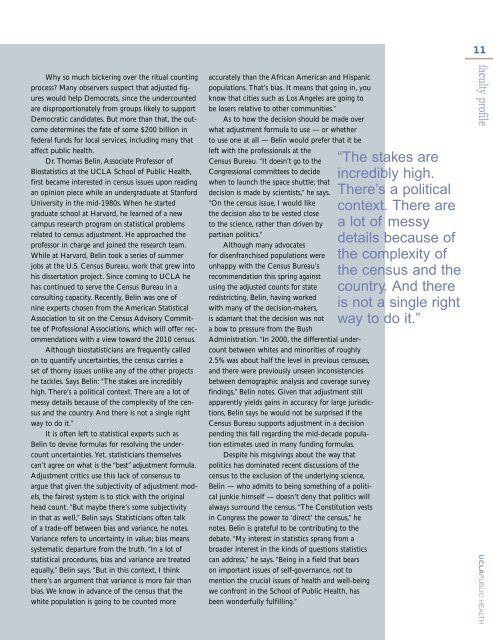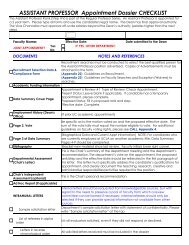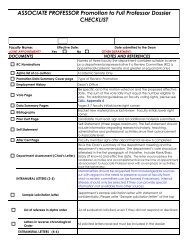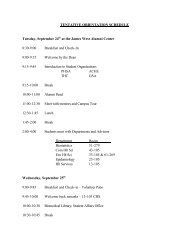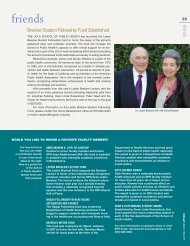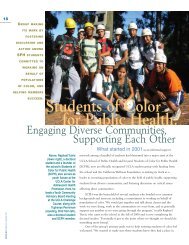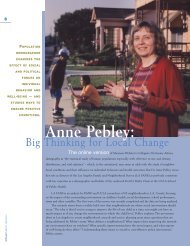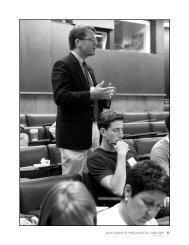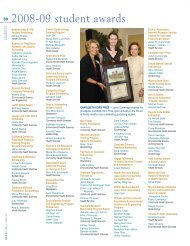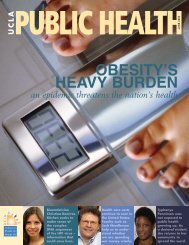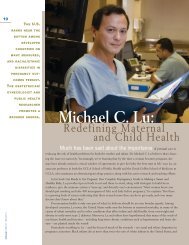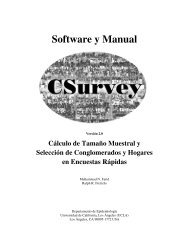JUNE 2001 - UCLA School of Public Health
JUNE 2001 - UCLA School of Public Health
JUNE 2001 - UCLA School of Public Health
Create successful ePaper yourself
Turn your PDF publications into a flip-book with our unique Google optimized e-Paper software.
11<br />
Why so much bickering over the ritual counting<br />
process? Many observers suspect that adjusted figures<br />
would help Democrats, since the undercounted<br />
are disproportionately from groups likely to support<br />
Democratic candidates. But more than that, the outcome<br />
determines the fate <strong>of</strong> some $200 billion in<br />
federal funds for local services, including many that<br />
affect public health.<br />
Dr. Thomas Belin, Associate Pr<strong>of</strong>essor <strong>of</strong><br />
Biostatistics at the <strong>UCLA</strong> <strong>School</strong> <strong>of</strong> <strong>Public</strong> <strong>Health</strong>,<br />
first became interested in census issues upon reading<br />
an opinion piece while an undergraduate at Stanford<br />
University in the mid-1980s. When he started<br />
graduate school at Harvard, he learned <strong>of</strong> a new<br />
campus research program on statistical problems<br />
related to census adjustment. He approached the<br />
pr<strong>of</strong>essor in charge and joined the research team.<br />
While at Harvard, Belin took a series <strong>of</strong> summer<br />
jobs at the U.S. Census Bureau, work that grew into<br />
his dissertation project. Since coming to <strong>UCLA</strong> he<br />
has continued to serve the Census Bureau in a<br />
consulting capacity. Recently, Belin was one <strong>of</strong><br />
nine experts chosen from the American Statistical<br />
Association to sit on the Census Advisory Committee<br />
<strong>of</strong> Pr<strong>of</strong>essional Associations, which will <strong>of</strong>fer recommendations<br />
with a view toward the 2010 census.<br />
Although biostatisticians are frequently called<br />
on to quantify uncertainties, the census carries a<br />
set <strong>of</strong> thorny issues unlike any <strong>of</strong> the other projects<br />
he tackles. Says Belin: “The stakes are incredibly<br />
high. There’s a political context. There are a lot <strong>of</strong><br />
messy details because <strong>of</strong> the complexity <strong>of</strong> the census<br />
and the country. And there is not a single right<br />
way to do it.”<br />
It is <strong>of</strong>ten left to statistical experts such as<br />
Belin to devise formulas for resolving the undercount<br />
uncertainties. Yet, statisticians themselves<br />
can’t agree on what is the “best” adjustment formula.<br />
Adjustment critics use this lack <strong>of</strong> consensus to<br />
argue that given the subjectivity <strong>of</strong> adjustment models,<br />
the fairest system is to stick with the original<br />
head count. “But maybe there’s some subjectivity<br />
in that as well,” Belin says. Statisticians <strong>of</strong>ten talk<br />
<strong>of</strong> a trade-<strong>of</strong>f between bias and variance, he notes.<br />
Variance refers to uncertainty in value; bias means<br />
systematic departure from the truth. “In a lot <strong>of</strong><br />
statistical procedures, bias and variance are treated<br />
equally,” Belin says. “But in this context, I think<br />
there’s an argument that variance is more fair than<br />
bias. We know in advance <strong>of</strong> the census that the<br />
white population is going to be counted more<br />
accurately than the African American and Hispanic<br />
populations. That’s bias. It means that going in, you<br />
know that cities such as Los Angeles are going to<br />
be losers relative to other communities.”<br />
As to how the decision should be made over<br />
what adjustment formula to use — or whether<br />
to use one at all — Belin would prefer that it be<br />
left with the pr<strong>of</strong>essionals at the<br />
Census Bureau. “It doesn’t go to the<br />
Congressional committees to decide<br />
when to launch the space shuttle; that<br />
decision is made by scientists,” he says.<br />
“On the census issue, I would like<br />
the decision also to be vested close<br />
to the science, rather than driven by<br />
partisan politics.”<br />
Although many advocates<br />
for disenfranchised populations were<br />
unhappy with the Census Bureau’s<br />
recommendation this spring against<br />
using the adjusted counts for state<br />
redistricting, Belin, having worked<br />
with many <strong>of</strong> the decision-makers,<br />
is adamant that the decision was not<br />
a bow to pressure from the Bush<br />
Administration. “In 2000, the differential undercount<br />
between whites and minorities <strong>of</strong> roughly<br />
2.5% was about half the level in previous censuses,<br />
and there were previously unseen inconsistencies<br />
between demographic analysis and coverage survey<br />
findings,” Belin notes. Given that adjustment still<br />
apparently yields gains in accuracy for large jurisdictions,<br />
Belin says he would not be surprised if the<br />
Census Bureau supports adjustment in a decision<br />
pending this fall regarding the mid-decade population<br />
estimates used in many funding formulas.<br />
Despite his misgivings about the way that<br />
politics has dominated recent discussions <strong>of</strong> the<br />
census to the exclusion <strong>of</strong> the underlying science,<br />
Belin — who admits to being something <strong>of</strong> a political<br />
junkie himself — doesn’t deny that politics will<br />
always surround the census. “The Constitution vests<br />
in Congress the power to ‘direct’ the census,” he<br />
notes. Belin is grateful to be contributing to the<br />
debate. “My interest in statistics sprang from a<br />
broader interest in the kinds <strong>of</strong> questions statistics<br />
can address,” he says. “Being in a field that bears<br />
on important issues <strong>of</strong> self-governance, not to<br />
mention the crucial issues <strong>of</strong> health and well-being<br />
we confront in the <strong>School</strong> <strong>of</strong> <strong>Public</strong> <strong>Health</strong>, has<br />
been wonderfully fulfilling.”<br />
“The stakes are<br />
incredibly high.<br />
There’s a political<br />
context. There are<br />
a lot <strong>of</strong> messy<br />
details because <strong>of</strong><br />
the complexity <strong>of</strong><br />
the census and the<br />
country. And there<br />
is not a single right<br />
way to do it.”<br />
faculty pr<strong>of</strong>ile <strong>UCLA</strong>PUBLIC HEALTH


